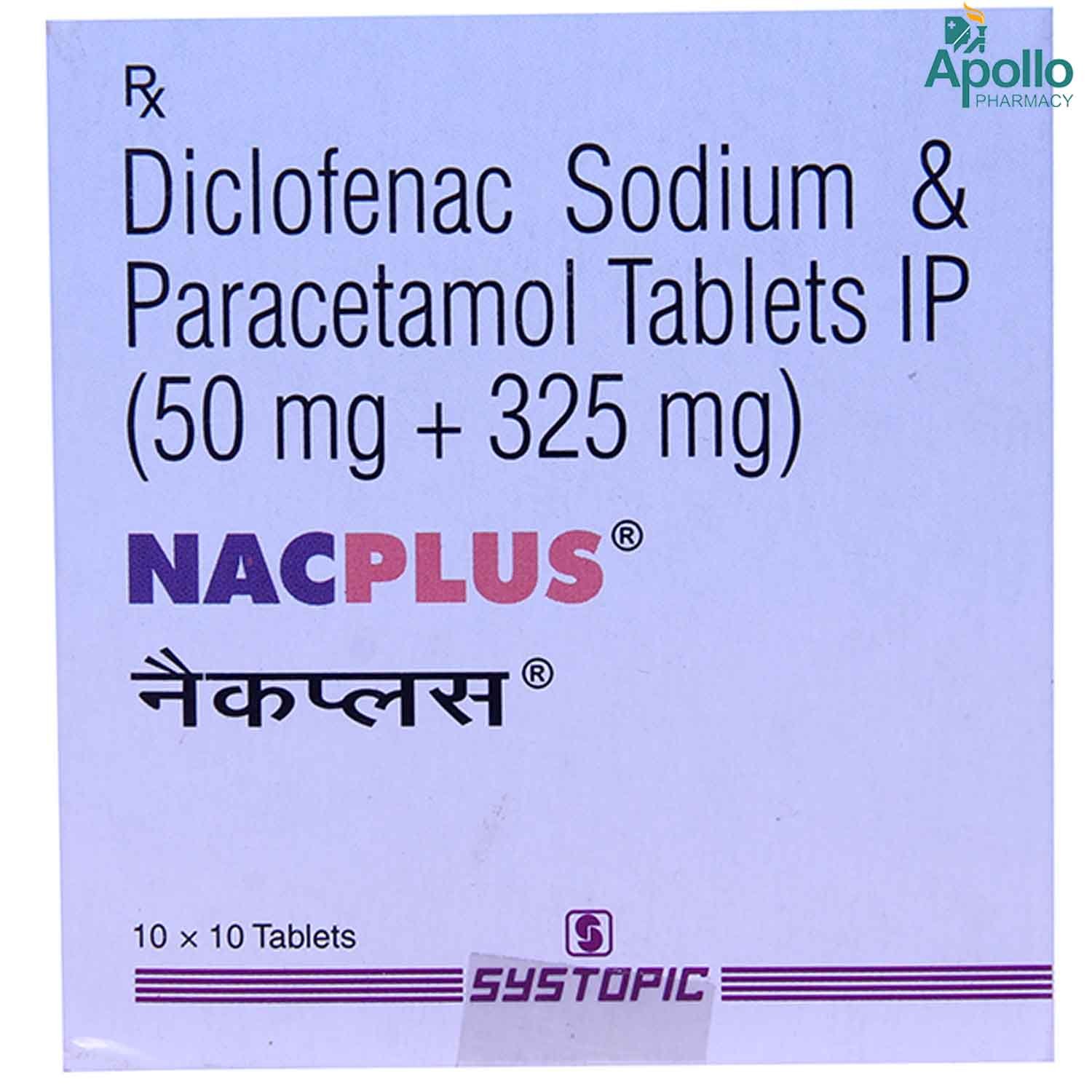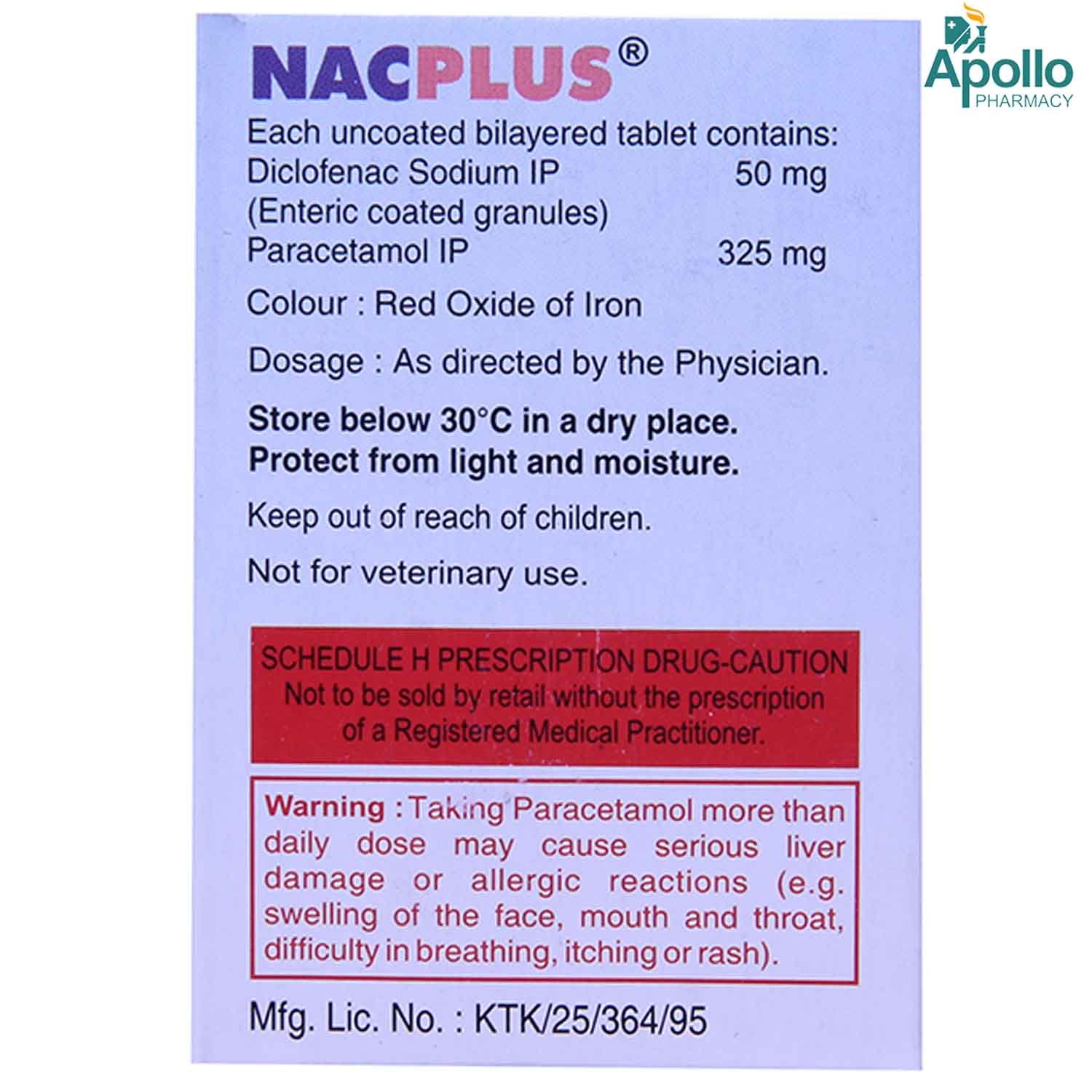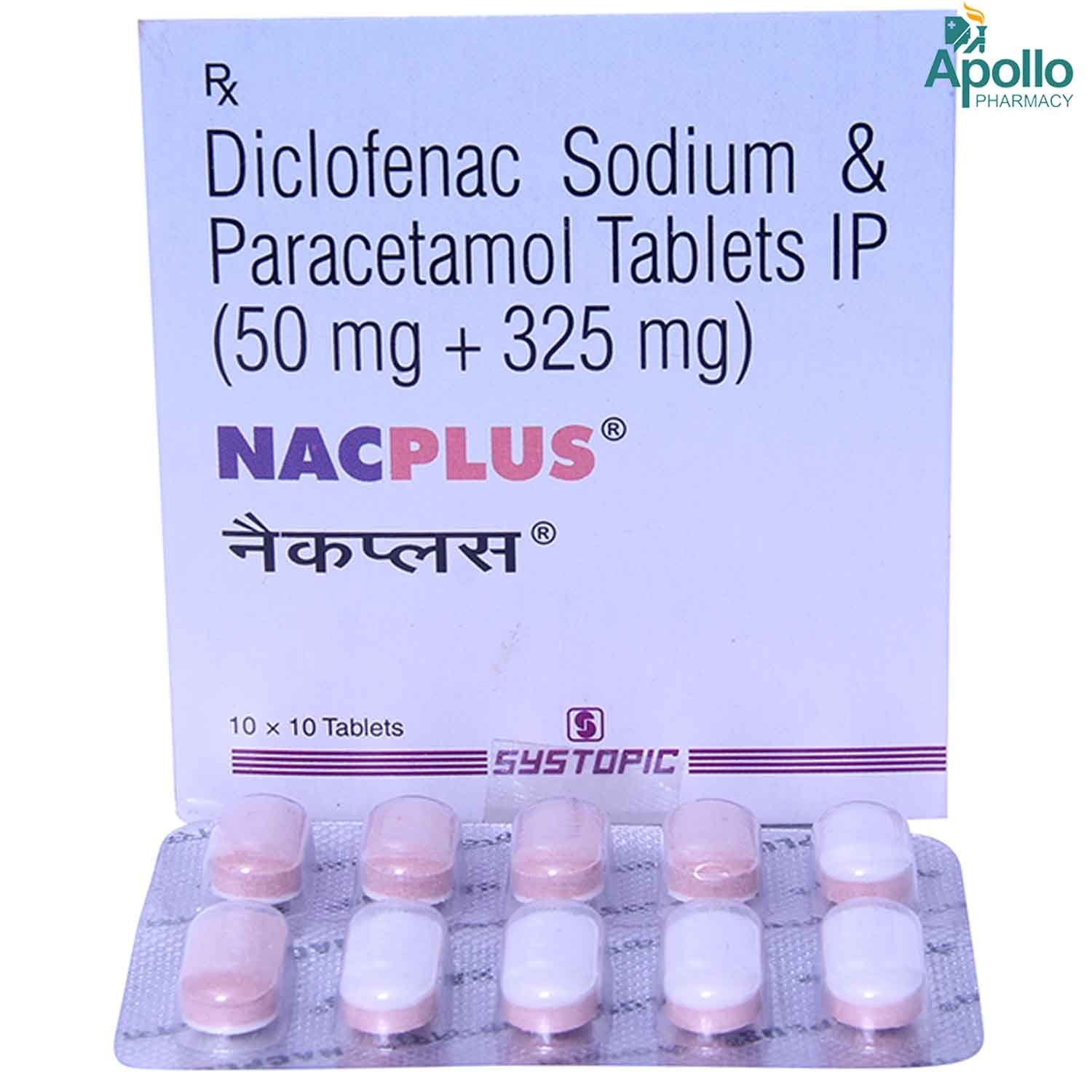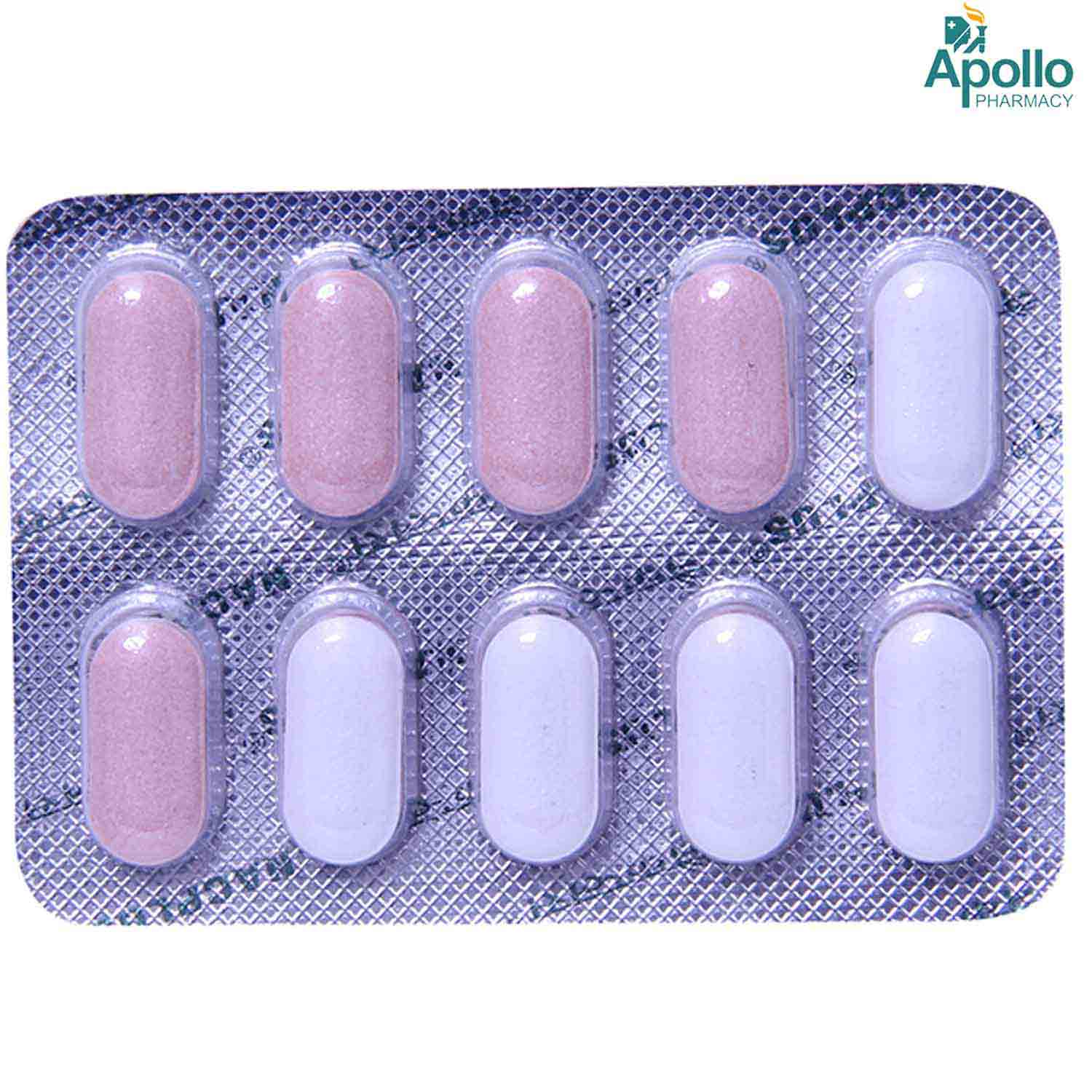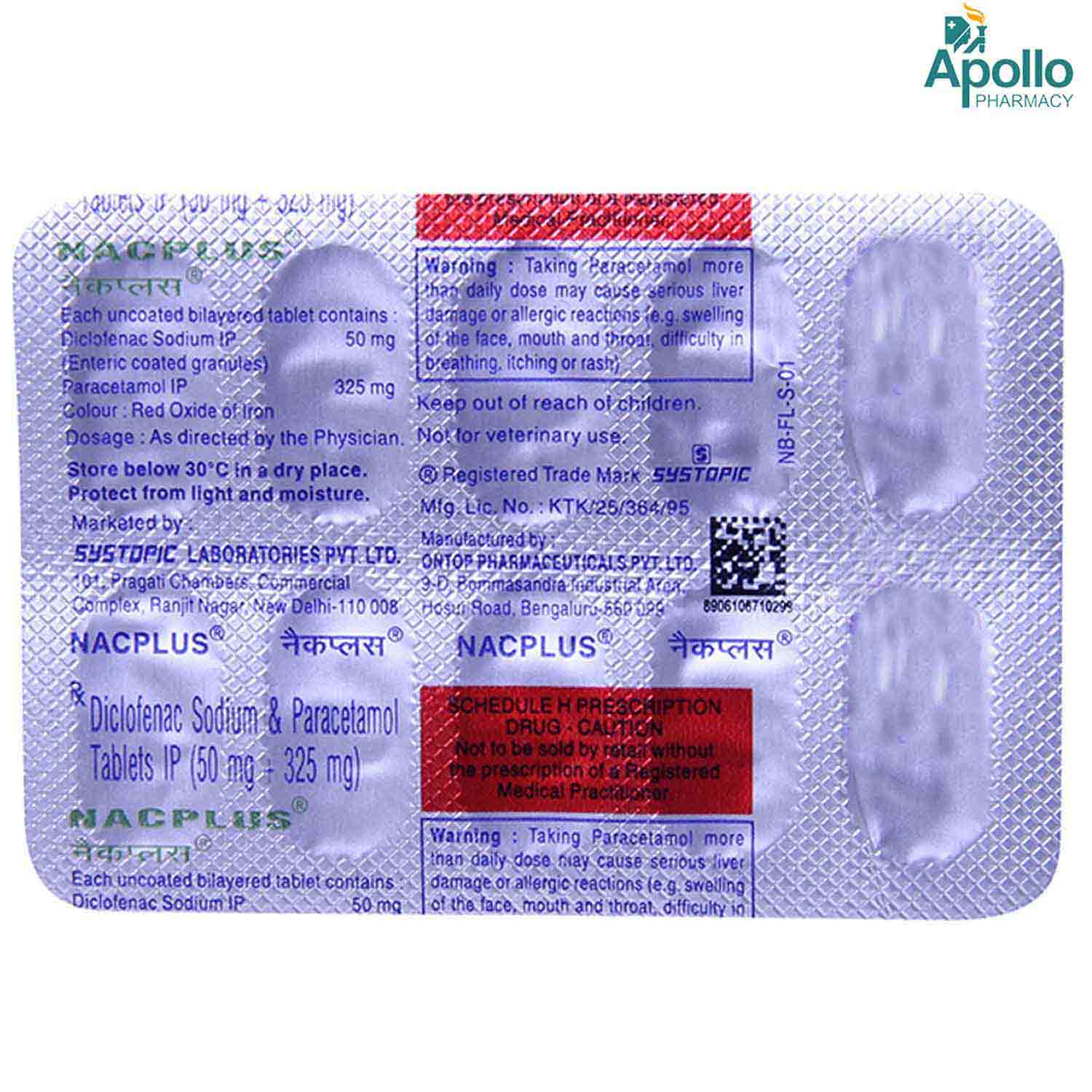NAC PLUS TABLET
MRP ₹30
(Inclusive of all Taxes)
₹4.5 Cashback (15%)
Provide Delivery Location
Online payment accepted
 Prescription drug
Prescription drugWhats That
Composition :
Manufacturer/Marketer :
Consume Type :
Expires on or after :
Return Policy :
About NAC PLUS TABLET
NAC PLUS TABLET belongs to a class of medications known as a non-steroidal anti-inflammatory drug (NSAID) or pain killer. NAC PLUS TABLET is primarily indicated for relieving pain associated with bones and muscles like osteoarthritis (joints pain), sprains and strains of muscles, rheumatoid arthritis (pain, swelling, and stiffness of joints) and ankylosing spondylitis (inflammation of the spine). This medicine also provides relief in pain associated with back pain, toothache, rheumatoid arthritis, painful menses, mild migraine, etc. Pain is an uncomfortable feeling in the body that can range from annoying to severe.
NAC PLUS TABLET contains Diclofenac (analgesic) and Acetaminophen (fever reducer/mild analgesic) effective against painful musculoskeletal pain, joint pain, and skeletal muscle spasms. Diclofenac works by blocking the action of a chemical messenger known as cyclo-oxygenase (COX) which causes pain and swelling at the injured or damaged tissue site. On the other hand, Acetaminophen acts as a mild analgesic (mild pain reducer) and antipyretic (fever reducer), which enhances the pain relief action of Diclofenac. Both medicines in combination work well to provide relief pain in different conditions.
Take NAC PLUS TABLET as prescribed by your doctor. You are advised to take NAC PLUS TABLET for as long as your doctor has prescribed it for you depending on your medical condition. Like all medicines, NAC PLUS TABLET may cause common side effects like stomach upset, dizziness, light-headedness, malaise, nausea, vomiting and liver dysfunction (hepatitis), pruritis (itchy skin), rash, although not everybody gets them. Stop taking this medicine if you experience symptoms like the tightness of the chest, breathing difficulties, fever, skin rashes, increased heart rate and or in case of any signs of hypersensitivity.
Do not take NAC PLUS TABLET if you are allergic to painkillers like aspirin, acetaminophen, naproxen or diclofenac. It is not recommended for use in children less than 14 years of age, people with liver disease, heart disease or gastric ulcers/bleeding problems. NAC PLUS TABLET may be associated with a small increase in the risk of heart attack (myocardial infarction). Pregnant women should not take this medicine during their last trimester of pregnancy. NAC PLUS TABLET is excreted in the breast milk so the nursing mother should contact the doctor before its usage. Avoid consumption of alcohol as it may damage your liver and cause even more side effects from taking this drug.
Uses of NAC PLUS TABLET
Directions for Use
Key Benefits
NAC PLUS TABLET is a combination medicine used to relieve pain and inflammation associated with osteoarthritis, rheumatoid arthritis, ankylosing spondylitis, muscle pain, tooth pain, bone and joint pain, headache, swelling, period pain, ear pain, migraine, fever, sore throat, nose pain, etc. By reducing the pain, NAC PLUS TABLET helps you to do normal daily activities of the day. Diclofenac present in NAC PLUS TABLET works by reducing the chemical messenger that is responsible for pain and inflammation in the body. While Acetaminophen works by blocking chemical messenger that sends pain signals to the brain. This medicine also reduces fever by regulating body temperature. Both medicines in combination increase the pain threshold and blood flow across the skin and provide relief in various painful conditions.
Storage
- Drink water or other clear fluids.
- To prevent worsening of pain, limit intake of tea, coffee, or alcohol.
- Include bland foods like rice, toast, crackers, and rice in your diet.
- Avoid lying down immediately after eating as it may cause indigestion or heartburn.
- Avoid acidic and spicy food as it may cause indigestion.
- Inform your doctor about your constipation symptoms. They may adjust your medication or advise alternative treatments.
- Stay hydrated by drinking sufficient of water (at least 8-10 glasses a day) to help soften stool and promote bowel movements.
- Increase fibre intake by eating foods high in fibre, such as fruits, whole grains, vegetables and legumes, to help bulk up the stool.
- Establish a bowel routine by trying to go to the bathroom at the same time each day to train your bowels.
- Engaging in regular exercise, like walking or yoga, can support in bowel movement stimulation.
- Consult your doctor if constipation persists, and discuss alternative treatments or adjustments to your medication.
- Inform Your Doctor: Notify your doctor immediately about your diarrhoea symptoms. This allows them to adjust your medication or provide guidance on managing side effects.
- Stay Hydrated: Drink plenty of fluids to replace lost water and electrolytes. Choose water, clear broth, and electrolyte-rich drinks. Avoid carbonated or caffeinated beverages to effectively rehydrate your body.
- Follow a Bland Diet: Eat easy-to-digest foods to help firm up your stool and settle your stomach. Try incorporating bananas, rice, applesauce, toast, plain crackers, and boiled vegetables into your diet.
- Avoid Trigger Foods: Steer clear of foods that can worsen diarrhoea, such as spicy, fatty, or greasy foods, high-fibre foods, and dairy products (especially if you're lactose intolerant).
- Practice Good Hygiene: Maintain good hygiene to prevent the spread of infection. To stay healthy, wash your hands frequently, clean and disinfect surfaces regularly, and avoid exchanging personal belongings with others.
- Take Anti-Diarrheal Medications: If your doctor advises, anti-diarrheal medications such as loperamide might help manage diarrhoea symptoms. Always follow your doctor's directions.
- Keep track of your diarrhoea symptoms. If they don't get better or worse or are accompanied by severe stomach pain, blood, or dehydration signs (like extreme thirst or dark urine), seek medical help.
- Take medications with food (if recommended): It can help prevent stomach distress and indigestion.
- Eat smaller, more frequent meals: Divide daily food intake into smaller, more frequent meals to ease digestion.
- Avoid trigger foods: Identify and avoid foods that trigger indigestion, such as spicy, fatty, or acidic foods.
- Stay upright after eating: Sit or stand upright for at least 1-2 hours after eating to prevent stomach acid from flowing into the oesophagus.
- Avoid carbonated drinks: Avoid drinking carbonated beverages, such as soda or beer, which can worsen indigestion.
- Manage stress: To alleviate indigestion, engage in stress-reducing activities like deep breathing exercises or meditation.
- Consult a doctor if needed: If indigestion worsens or persists, consult a healthcare professional to adjust the medication regimen or explore alternative treatments.
- Tell your doctor about your GAS symptoms. They may change your medication regimen or prescribe additional drugs to help you manage them.
- To manage GAS symptoms, eat a balanced diet of fibre, vegetables, and fruits.
- Drink enough water throughout the day to avoid constipation and treat GAS symptoms.
- Regular exercise like yoga and walking may help stimulate digestion and alleviate GAS symptoms.
- Take probiotics only if your doctor advises, as they may help alleviate GAS symptoms by promoting gut health.
- Take medication for GAS symptoms only if your doctor advises, as certain medications can interact with your existing prescriptions or worsen symptoms.
- If symptoms persist, worsen, or are accompanied by severe abdominal pain, vomiting, or bleeding, seek immediate medical attention.
- Inform your doctor about the nausea and discuss possible alternatives to the medication or adjustments to the dosage.
- Divide your daily food intake into smaller, more frequent meals to reduce nausea.
- Opt for bland, easily digestible foods like crackers, toast, plain rice, bananas, and applesauce.
- Avoid certain foods that can trigger nausea, such as fatty, greasy, spicy, and smelly foods.
- Drink plenty of fluids, such as water, clear broth, or electrolyte-rich beverages like coconut water or sports drinks.
- Use ginger (tea, ale, or candies) to help relieve nausea.
- Get adequate rest and also avoid strenuous activities that can worsen nausea.
- Talk to your doctor about taking anti-nausea medication if your nausea is severe.
- Record when your nausea occurs, what triggers it, and what provides relief to help you identify patterns and manage your symptoms more effectively.
Drug Warnings
Do not take NAC PLUS TABLET if you have/had severe heart problems, stomach ulcer or perforation, bleeding problems such as bleeding from the stomach, intestine or brain, have undergone any heart bypass surgery, have had any heart attack, blood circulation problems or inflammation of intestines. Patients with asthma, prolonged bleeding time, wheezing (whistling sound during breath) and blocked airways (bronchospasm) should avoid using NAC PLUS TABLET. Consult your doctor if your symptoms of pain, inflammation and fever do not disappear even after ten days. If you are using topical form NAC PLUS TABLET you should avoid direct exposure to the sunlight as sunburn or photosensitivity might occur. Keep your doctor informed about your health condition and medicines to rule out any side-effects. Avoid simultaneous consumption of other painkillers or cough and cold medicines with this NAC PLUS TABLET as it may lead to overdose. Stop taking NAC PLUS TABLET and consult your doctor immediately if you have stomach pain or any signs of bleeding in the intestine or stomach such as blood in stools. Do not take any other NSAID's for pain relief along with NAC PLUS TABLET unless prescribed.
Drug-Drug Interactions
Drug-Drug Interactions
Login/Sign Up
Co-administration of Nac Plus Tablet with Meloxicam can increase the risk or severity of gastrointestinal side effects.
How to manage the interaction:
Taking Meloxicam with Nac Plus Tablet is not recommended as it can possibly result in an interaction, it can be taken if your doctor has advised it. However, consult your doctor immediately if you experience symptoms such as dizziness, lightheadedness, red or black, tarry stools, coughing up or vomiting fresh or dried blood that looks like coffee grounds, severe headache, and weakness. Do not stop any medication without doctor's advise.
Co-administration of Nac Plus Tablet with Mipomersen may cause liver problems.
How to manage the interaction:
Co-administration of Nac Plus Tablet and Mipomersen can lead to an interaction, it can be taken if advised by your doctor. However, if you experience any symptoms like fever, chills, joint pain or swelling, unusual bleeding or bruising, skin rash, itching, loss of hunger, fatigue, nausea, vomiting, abdominal pain, dark urine, pale stools, and/or yellowing of the skin or eyes. Do not discontinue any medications without consulting a doctor.
Taking Nac Plus Tablet with Ibrutinib can increase the risk of bleeding tendencies.
How to manage the interaction:
There may be a possible interaction between Nac Plus Tablet and Ibrutinib, but they can be taken together if a doctor has prescribed them. However, consult a doctor immediately if you experience any unusual bleeding, dizziness, lightheadedness, red or black, tarry stools, coughing up or vomiting fresh or dried blood that looks like coffee grounds, or severe headaches. Do not discontinue any medications without consulting a doctor.
Taking Nac Plus Tablet with bromfenac will have an additive effect and may increase the risk of side effects in the gastrointestinal tract such as inflammation, bleeding, ulceration, and rarely, perforation.
How to manage the interaction:
There may be possible interaction between Nac Plus Tablet and bromfenac but you can take it if prescribed by a doctor. Consult your doctor if you experience any unusual bleeding or bruising or have other signs and symptoms of bleeding such as dizziness; lightheadedness; red or black, tarry stools; coughing up or vomiting fresh or dried blood that looks like coffee grounds; severe headache; and weakness. Do not stop using any medications without first talking to your doctor.
Taking Nac Plus Tablet and ibuprofen can increase the risk of stomach bleeding and ulcers.
How to manage the interaction:
Co-administration of Nac Plus Tablet and Ibuprofen can lead to an interaction, it can be taken if advised by your doctor. However, if you experience any symptoms like unusual bleeding or bruising, dizziness, lightheadedness, red or black, tarry stools, coughing up or vomiting fresh or dried blood that looks like coffee grounds, severe headache, and weakness, consult your doctor immediately. Do not stop using any medications without a doctor's advice.
Co administration of Nac Plus Tablet with Leflunomide may result in liver problems.
How to manage the interaction:
Co-administration of Nac Plus Tablet and Leflunomide can lead to an interaction; it can be taken if advised by your doctor. However, if you have a fever, chills, joint pain or swelling, unusual bleeding or bruising, skin rash, itching, loss of appetite, fatigue, nausea, vomiting, abdominal pain, dark-colored urine, light-colored stools, or yellowing of the skin or eyes. Do not stop using any medication without consulting your doctor.
Co-administration of Rivaroxaban together with Nac Plus Tablet may increase the risk of unsual bleeding.
How to manage the interaction:
Co-administration of Nac Plus Tablet and Rivaroxaban can lead to an interaction; it can be taken if advised by your doctor. However, if you experience any symptoms like unusual bleeding or bruising, dizziness, lightheadedness, red or black, tarry stools, coughing up or vomiting fresh or dried blood that looks like coffee grounds, severe headache, and weakness, consult your doctor immediately. Do not stop using any medications without a doctor's advice.
Taking Nac Plus Tablet with Lomitapide will have an additive effect and may cause liver problems.
How to manage the interaction:
There may be a possible interaction between Nac Plus Tablet and Lomitapide, but they can be taken together if your doctor has prescribed them. However, consult your doctor immediately if you have fever, chills, joint pain or swelling, unusual bleeding or bruising, skin rash, itching, loss of appetite, fatigue, nausea, vomiting, abdominal pain, dark colored urine, light colored stools, and/or yellowing of the skin or eyes. Do not stop using any medications without a doctor's advice.
Taking Nac Plus Tablet with warfarin may, increase the risk of bleeding.
How to manage the interaction:
There may be a possible interaction between Nac Plus Tablet and Warfarin, but they can be taken together if a doctor has prescribed them. However, consult your doctor immediately if you experience unusual bleeding or bruising, vomiting, blood in your urine or stools, headache, dizziness, or weakness, contact a doctor. Do not discontinue any medications without consulting a doctor.
Coadministration of Nac Plus Tablet with Ketoconazole may increase the risk of liver problems.
How to manage the interaction:
There may be a possible interaction between Nac Plus Tablet and Ketoconazole, but they can be taken together if a doctor has prescribed them. However, consult a doctor immediately if you have fever, chills, joint pain or swelling, unusual bleeding or bruising, skin rash, itching, loss of appetite, fatigue, nausea, vomiting, abdominal pain, dark colored urine, light colored stools, and/or yellowing of the skin or eyes. Do not discontinue any medications without consulting a doctor.
Drug-Food Interactions
Drug-Food Interactions
Login/Sign Up
Diet & Lifestyle Advise
- Exercising regularly helps in muscle stretching so that they are less likely to spasm, tear and sprain. Mild exercises such as jogging and walking are helpful for muscle stretching.
- Massages can also be helpful.
- Avoid freezing and hot temperatures.
- Avoid wearing tight-fitting clothes, instead, wear loose garments.
- Rest well, get plenty of sleep.
- To avoid developing pressure sores, change your position at least every two hours.
- Hot or cold therapy can help treat muscle spasms. Apply an ice-pack or hot-pack on the muscle for 15-20 minutes.
- Stay hydrated, drink plenty of water.
Side Effects of NAC PLUS TABLET
- Nausea
- Vomiting
- Stomach pain
- Diarrhoea
- Indigestion
- Headache
Habit Forming
Therapeutic Class
All Substitutes & Brand Comparisons
Drug-Diseases Interactions
Drug-Diseases Interactions
Login/Sign Up
FAQs
NAC PLUS TABLET should not be taken as a long term medication as it may lead to stomach ulcers/bleeding and kidney problems. For best results of NAC PLUS TABLET, take it in doses and duration mentioned by your doctor.
NAC PLUS TABLET is not indicated for stomach pain. Also, If you have stomach pain post-ingestion it may be a sign of stomach ulcer or gastric bleeding. Do not take NAC PLUS TABLET in this condition. It is better to inform your doctor in case of stomach pain.
It is advised not to take NAC PLUS TABLET until prescribed by your doctor.
Yes, NAC PLUS TABLET is a short term medication and if you feel better you can stop taking NAC PLUS TABLET, but only after consulting your doctor.
NAC PLUS TABLET is a combination of two drugs, namely: Diclofenac, and Acetaminophen. Diclofenac and Acetaminophen work by blocking the effect of a chemical messenger known as cyclo-oxygenase (COX) enzymes that make another chemical prostaglandin (PG). By blocking the COX enzyme's effect, lesser PGs are produced, which reduces mild to moderate pain, fever and inflammation at the injured or damaged site.
NAC PLUS TABLET is used to reduce and relieve pain and inflammation associated with osteoarthritis, rheumatoid arthritis and ankylosing spondylitis. Arthritis is the tenderness and swelling in the joints.
NAC PLUS TABLET should not be taken for longer durations unless prescribed by the doctor. If NAC PLUS TABLET has been prescribed for longer durations, regular monitoring of kidney function, liver function and blood count is advised, particularly in elderly patients.
Diarrhea might be a side-effect of NAC PLUS TABLET. Drink enough fluids and eat fiber rich food if you experience diarrhea. If you find blood in stools (tarry stools) or if you experience excess diarrhea consult your doctor. Do not take anti-diarrheal medicine on your own.
No, NAC PLUS TABLET is not used to treat migraine, it is used to decrease pain caused by mild migraine.
Drug-Drug Interactions Checker List
- TACROLIMUS
- CYCLOSPORINE
- CHLORAMPHENICOL
- MIFEPRESTONE
- CHOLESTYRAMINE
- DOMPERIDONE
- IMATINIB
- MAGNESIUM HYDROXIDE
- KETOCONAZOLE
- VORICONAZOLE
- METOCLOPRAMIDE
- SULFINPYRAZONE
- AMIDODARONE
- FLUCONAZOLE
- MICONAZOLE
- METHOTREXATE
- WARFARIN
- DIGOXIN
- IBUPROFEN
- LITHIUM
- ASPIRIN
Special Advise
- Prolonged use of NAC PLUS TABLET may increase the risk of heart diseases. So if you have any heart problems or have undergone any planned heart bypass surgery, please do not take NAC PLUS TABLET and consult a doctor.
- If you have had a gastrointestinal ulcer or bleeding problem, do not take NAC PLUS TABLET.
- NAC PLUS TABLET should not be given to the children less than 10 years of age.
- Close monitoring of infections as NAC PLUS TABLET may mask the signs and symptoms of infection.
Disease/Condition Glossary
Pain: Pain is a symptom triggered by the nervous system, causing uncomfortable sensations in the body. Pain may be dull or sharp, it might be constant or may come and go. The tolerance level of pain might vary from person to person. Pain can be generalized (overall body aches) or localized (affecting a specific area of the body). Pain can be considered a good thing as it helps us know that something is wrong in the body and thereby helps diagnose the condition. The common causes of pain include headache, muscle strain, cramps, cuts, bone fractures, and arthritis.
Osteoarthritis: It is a joint disease in which the two ends of the joints come together due to the breakdown of a protective covering of cartilage. Due to the absence of this protective covering, the joints rub against each other, leading to pain and stiffness. Symptoms include pain, stiffness, inflammation, and tenderness.
Rheumatoid arthritis: It is an auto-immune disease (the body's immune system attacks its tissue), leading to joint pain and damage. Symptoms of rheumatoid arthritis include pain, swelling, stiffness, deformities, and loss of joint function.
Ankylosing spondylitis: It causes pain and stiffness in the spine. The pain generally starts in the lower back and can spread to the neck, damaged joints, or other body parts. Ankylosing spondylitis includes decreased flexibility which usually leads to hunched-forward posture, pain, and back, and joints.
Migraine: A headache of varying intensity, often accompanied by nausea and sensitivity to light and sound.

Have a query?
Alcohol
Safe if prescribed
Avoid consumption of alcohol while taking NAC PLUS TABLET as it may increase drowsiness. It can also increase the risk of stomach bleeding.
Pregnancy
Consult your doctor
Avoid taking NAC PLUS TABLET if you are pregnant unless prescribed by a doctor. Please consult your doctor if you have any concerns regarding this, your doctor will prescribe only if the benefits outweigh the risks.
Breast Feeding
Consult your doctor
Consult your doctor before taking NAC PLUS TABLET, your doctor will decide whether NAC PLUS TABLET can be taken by breastfeeding mothers or not.
Driving
Safe if prescribed
NAC PLUS TABLET may affect driving ability as it causes headaches, blurred vision, dizziness or drowsiness so do not drive or operate machinery unless you are alert.
Liver
Consult your doctor
Dose adjustment may be needed in patients with liver impairment. Please consult your doctor if you have a liver impairment or any concerns regarding this.
Kidney
Consult your doctor
Dose adjustment may be needed in patients with kidney impairment. Please consult your doctor if you have kidney impairment or any concerns regarding this.
Children
Safe if prescribed
NAC PLUS TABLET is not recommended for children below 12 years of age without the doctor's consent. For children above 12 years, the dose needs to be adjusted and recommended by a child specialist only.

